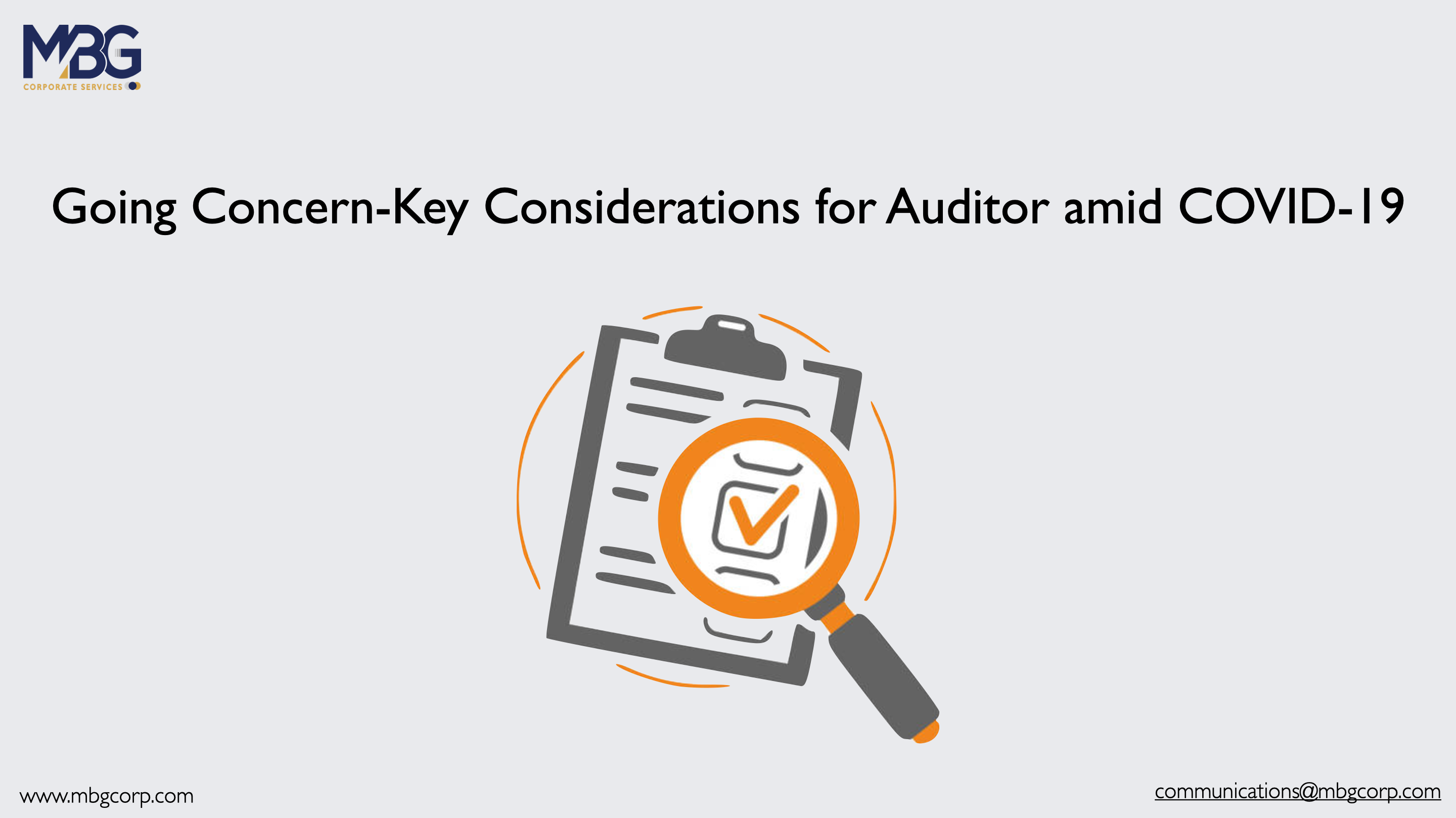Going Concern-Key Considerations for Auditor amid COVID-19

ICAI issue Guidance Note on May 10th, 2020 on Key Considerations for Auditor amid COVID-19. Key takeaways are as follows:
Background
Section 134(5) of the Companies Act, 2013 requires the board of directors of every company to state in its Directors’ Responsibility Statement that they have prepared the annual accounts on a going concern.
Also, Ind AS 1 – Presentation of Financial Statements and AS 1 – Disclosure of Accounting Policies requires the management to assess the entities ability to continue as a going concern.
Given the economic uncertainties due to Covid-19 and business disruption for entities in almost all sectors, there is likely to be an increase in events and circumstances which may cast significant doubt on the entitles ability to continue as a going concern.
Recent Developments
The International Accounting and Auditing Standards Board (IAASB) and The Institute of Chartered Accountants of India (ICAI) have issued guidance on going concern assessment amid COVID-19 for companies and considerations for an auditor while evaluating the management’s assessment.
The guidance note issued by ICAI focuses on the following matters:
-
- Matters an auditor should consider for going concern assessment due to COVID-19 and inherent uncertainty.
- Period of Going Concern Assessment
- Implications for the Auditors report
- Management and auditors respective responsibilities in relation to going concerned
- Additional audit procedures required when events or conditions are identified which may cast significant doubt on the entities ability to continue as a going concern.
Some of the important considerations highlighted by the ICAI guidance are as follows:
-
- Assess what impact the current events have on an entity’s operations and forecasted cash flows.
- Consider the existing and anticipated effects of the COVID-19 on the assumptions.
- Assess specific matters relating to COVID-19.
Few considerations are highlighted below:
Regulatory Considerations:
-
- The impact of measures taken by governments in all the countries where the entity operates.
- Changes to the entity’s access to capital impacted by measures taken by regulators (industry and/or financial) or banks.
- The entity’s ability to prepare timely financial statements or other required information/filings, including delays in receiving financial data from operations in other countries or material investees for consolidated financial statements.
- The entity’s ability to meet regulatory ratios.
Operating Environment Considerations
-
- Restructuring of the entity and it’s business (e.g., store closures, workforce reduction) that may be needed to generate sufficient cash flows.
- The level of lost revenue and cash flows including the effect of rebates, refunds, and allowances
- The risks relating to delivering products and services
- Loss of existing contracts and futures contracts, particularly if facilities are being repurposed to support restructuring or recover losses arising due to COVID-19.
- Inability to honor certain terms of contracts leading to penalties by regulators/ counterparties and suitability of invocation of force majeure clauses.
- Foreign exchange fluctuations and how these have been considered.
- Customers finding other sources of supply during the COVID-19 pandemic and not returning.
- The ability of the business model to operate under current COVID-19 restrictions and whether the business model will be sustainable post COVID-19 (e.g., travel and leisure industry).
- Overseas supplies are no longer available due to overseas governments’ actions.
- Costs associated with the temporary suspension of operations
Liquidity Considerations
-
- The risk relating to receivables (delays or failures of counterparties, requests for changes in payment terms).
- Loss in ability to factor trade receivables due to uncertainties over collectability.
- Risk of significant business expansion into a new sector that is not sustainable in the future.
- Understanding the sources of available cash – shareholders (including related parties), lenders.
- Determination of whether funding facilities are on demand or committed, any representations or warranties required by funding agreements, and if there is a risk of funding being withdrawn.
- Risk of contingent liabilities (bank guarantees, performance guarantees, bonding, etc.).
Key Points relating to going Concern Assumption:
1. The auditor should consider the following mitigating factors when going concern assumption is not holding good:
-
- Capital expenditure reductions;
- Reduction in dividends;
- Suspension of non-performance based bonuses;
- Deferral of payments of principal and interest;
- Working capital reduction, taxation payment holidays, or deferrals or COVID-19 driven government funding.
2. In assessing the entities ability to continue as a going concern, the management shall consider for at least but not limited to 12 months from the end of reporting period.
3. In case after the reporting period, management determines that it intends to liquidate the entity or cease trading, or that it has no realistic alternative but to do so, the financial statements may require a fundamental change in the basis of accounting, rather than an adjustment to the amounts recognized within the original basis of accounting.
4. Additional audit procedures when events or conditions are identified that may cast significant doubt on entities ability to continue as a Going concern.
-
- Analyzing and discussing cash flow, profit, and other relevant forecasts with management.
- Analyzing and discussing the entity’s latest available interim financial statements.
- Reading the terms of debentures and loan agreements and determining whether any have been
- Inquiring of the entity’s legal counsel regarding the existence of litigation and claims.
- Confirming the existence, legality, and enforceability of arrangements to provide or maintain financial support with related and third parties.
- Evaluating the entity’s plans to deal with unfilled customer orders.
- Performing audit procedures regarding subsequent events to identify those that either mitigate or otherwise affect the entity’s ability to continue as a going concern.
- Confirming the existence, terms, and adequacy of borrowing facilities.
Impact on Auditors Report :
-
- Use of going concern basis of accounting is inappropriate: If the financial statements have been prepared using the going concern basis of accounting but, in auditors judgment management use of going concern basis of accounting in the preparation of financial statements is inappropriate the auditor would express an Adverse Opinion.
- Use of going concern basis of accounting is inappropriate but a material uncertainty exists which has been adequately disclosed in the financial statements: The Auditor would express an unmodified opinion and the auditor’s report would include a separate section under the heading material uncertainty Related to Going Concerned.
- Use of going concern basis of accounting is inappropriate but a material uncertainty exists which has not been adequately disclosed in the financial statements: The auditor should express a qualified opinion or adverse opinion.
- The auditor identifies events that may cast significant doubt on entities ability to continue as a going concern and no material uncertainty exists and disclosures are adequate: The Auditor shall report the same in the Key Audit Matters (KAM) of the report.
The complete text of the Guidance Note may be viewed at below link:
Website Link: https://resource.cdn.icai.org/59473aasb48392.pdf
Last Updated: 17th September 2020 This article is contributed by: CA Sanya Kapoor Executive, Audit and AssuranceTag: Audit


